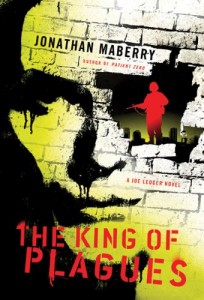The King of Plagues by Jonathan Maberry
Jonathan Maberry is a master at ratcheting up the stakes and forcing his heroes to confront the evilest of evil, villains who threaten the world with unimaginable horrors that have the potential to create devastating results. Maberry delivers again in his latest thriller, The King of Plagues, out this month from St. Martin’s Griffin. New York Times bestselling author Brad Thor states that King of Plagues is “A fast-paced, brilliantly written novel. The hottest thriller of the New Year!” And international bestselling author F. Paul Wilson says “Headlong action, up-to-the-minute science, and intriguingly conflicted characters—do not miss The King of Plagues.”
Jonathan Maberry’s fans often wonder when he sleeps. He’s a NY Times bestselling author and multiple Bram Stoker Award winner. Maberry’s Joe Ledger series includes, Patient Zero (2009); The Dragon Factory (2010); The King of Plagues (2011); and Assassin’s Code (2012). Maberry also writes for Marvel Comics, and his other recent works include Rot & Ruin and Wanted Undead or Alive.
BIG THRILL: Tell us about The King of Plagues and what makes it such a great read?
JONATHAN MABERRY: The King of Plagues is the 4th Joe Ledger thriller, and it takes the series in a new direction. Where the first two books, Patient Zero and The Dragon Factory, focused on weird science and designer pandemics, for The King of Plagues I decided to explore the creepy world of conspiracy theories and secret societies. This is my most character-driven story so far. I deconstruct the heroes and villains to explore the forces at work in their lives and discover why they must do what they do. At the same time, it has huge action set pieces, torn-from-the-headlines social and political issues, and Joe Ledger’s trademark smartass humor. The villains in the book are the Seven Kings, a secret society that has hijacked bits and pieces of the history of real and fictional groups like the Illuminati to build a terrifying mythology. They also use social media to instigate hate crimes, perpetuate their legend, and to set the stage for their next terrorist event.
BIG THRILL: In The King of Plagues, you again draw on an ancient horror and modernize it as you did with The Dragon Factory (eugenics/Nazi experiments). Why did you choose to weaponize the Ten Plagues of Egypt for this book, and what makes them such a threat to the world?
 MABERRY: I love smart, practical and self-aware villains. The Seven Kings are tapping into a lot of what drives paranoia in our modern world. The original Ten Plagues from the Old Testament took place in the Middle East and were as much a religious struggle as they were political. The Seven Kings’ agenda is chaos and destabilization, and they use that ancient mythology as the psychological/spiritual component of their campaign to reinforce the social instability of their terrorist attacks. As a result, they create mystery, fear, paranoia, terror and social upheaval. I’m just cynical enough to believe that there are extremist groups, perhaps even governments, doing that sort of thing right now.
MABERRY: I love smart, practical and self-aware villains. The Seven Kings are tapping into a lot of what drives paranoia in our modern world. The original Ten Plagues from the Old Testament took place in the Middle East and were as much a religious struggle as they were political. The Seven Kings’ agenda is chaos and destabilization, and they use that ancient mythology as the psychological/spiritual component of their campaign to reinforce the social instability of their terrorist attacks. As a result, they create mystery, fear, paranoia, terror and social upheaval. I’m just cynical enough to believe that there are extremist groups, perhaps even governments, doing that sort of thing right now.
King of Plagues also has two of the most disturbing characters I’ve ever come up with: Rafael Santoro and Nicodemus. One is a sadistic psychopath and the other is…well, ‘different’ is all I want to say. I don’t want to spoil anything.
BIG THRILL: Joe Ledger is a smart hero. He’s tough, resourceful, and an extremely skilled leader. A man of honor and integrity. A smart-ass too, at times, with a vulnerability that makes him even more appealing to the reader. And when it comes to taking down the bad guys, Joe’s a warrior who will do what he has must to get the job done. Why does this combination of traits and skills make Joe Ledger such a great protagonist?
MABERRY: Joe is an idealist hero. He believes that good should triumph over evil, but he’s also a realist and he knows that good doesn’t always win. Joe has been the victim of violence, he’s seen violence consume good and innocent people, and he’s psychologically fractured. However, he’s learned to use his own damage as a weapon. It makes him unpredictable, and it makes him very hard to stop.
When we catch up with him in King of Plagues, he’s coming off a terrible personal loss, and it’s not the first time his world has been torn apart by grief. He’s not sure if he wants to continue to be a hunter and killer. This book allows him to explore who he is and what his role will be in a very troubled world.
BIG THRILL: You stated, “playing with a flawed character that is put in the position of having to play hero is a great challenge, and it fires up the imagination.” Explain.
MABERRY: People who have experienced great trauma are often more sensitive to issues of right and wrong. Some of them become bitter and cynical; some hold onto their idealism and use it as a strength rather than a weakness. That’s Joe. He knows what it feels like to be hurt, to be attacked and trampled, and he doesn’t want to see that happen to anyone else.
He also has three different people living inside his head: the Civilized Man, the Cop, and the Killer. Joe has learned how to make all three aspects of his personality work as a team. The Civilized Man maintains his idealism and optimism; the Cop manages things and investigates the threats; and when the bad guys are in the crosshairs it’s the Killer who pulls the trigger.
BIG THRILL: The King of Plagues is another fast-paced, action-packed thriller. How do you simultaneously show so much action yet reveal character vulnerability?
MABERRY: Good drama is not about big events but about people whose lives are caught up and changed by those events. I was five years old when John F. Kennedy was shot. I remember the deaths of Martin Luther King and Bobby Kennedy. I remember the Vietnam War, the Civil Rights era, the Landing on the Moon, Watergate, the Challenger Disaster, 9/11, the two Iraq wars, the current war in Afghanistan, and events like the Tsunami, the Haitian earthquake and Hurricane Katrina. When you look at all of those events, it isn’t really the big picture—the space ships, war ships and refugee ships— that you remember, it’s the faces of the people. Victims, survivors, aid workers, children, heroes, and the reporters. People are history.
How, then, can you write novels about big events and not concentrate on what makes the story compelling? Characters. People.
In stories where there is a vast, shared crisis, you get to see how the same set of events warps the lives, perceptions, relationships and personalities of the characters.
Funny thing, though…in action thrillers the reviews seldom comment on character development because they are caught up in the pace of the novel. You see that in reviews of books by Vince Flynn, Brad Thor and James Rollins. The character development is absolutely there, but the books are so damn fast-paced and entertaining that readers and reviewers are sometimes not conscious of the character development. And yet…they’ll rush back for the next one because they’ve fallen in love with the characters. Weird, but there it is.
BIG THRILL: The Department of Military Sciences (DMS), the military unit that recruited Joe, is an organization that doesn’t run within the confines of the normal chain of command. Why is this freedom from constraint important to the DMS’s success, and what latitude does this set-up give you as a writer?
MABERRY: It’s a red-tape thing. I know a lot of people in government and military service, and most of them are truly well-intentioned and really want to do the right thing in the right way. However, bureaucracy is a fact of political life, and it is never, never a least-resistance pathway.
Mr. Church, the mysterious head of the DMS, loathes the red tape slowdown. He’s an ultra-realist who knows that there are threats out there that have to be dealt with right now. Church has gathered the top scientists and special operators to be the front line in his personal war.
I’ve gotten a lot of reader mail from folks in the military who say that they wish there was a DMS and a Mr. Church. So do I.
BIG THRILL: You alternate between first and third person narratives which allow you to explore Joe Ledger’s perspective of the world and also the villains’. How does this technique enable you to create a richer story?
MABERRY: In the James Bond movies there’s always a point where the villain sits Bond down and explains the entire master plan—usually before he orders Bond executed. That’s a pure exposition dump. A real special operator would almost never get to meet the villain, and would certainly not have a chance to sit and chat with him.
When I was writing Patient Zero, the first book in the series, I realized that there was never going to be an opportunity for Joe to meet the villain. I felt that was unfair to the reader and no fun at all for me. I always want to know the motivations behind every character.
So, I decided to tell a second story within the novel. Joe’s story is a personal journey, so I decided to write that in first person. But with the villains, since Joe isn’t there, I shifted to third person to tell the other story. This works really well in the King of Plagues because there are a whole lot of things going on behind the scenes, and I wanted to tell the complete story.
BIG THRILL: What’s next for Jonathan Maberry?
MABERRY: Wow…this is going to be an insane year. I have three novels due out in 2011. After King of Plagues, I have my second teen novel, Dust & Decay, coming out in August from Simon & Schuster. Then in October, St. Martin’s Griffin will release my standalone zombie novel, Dead of Night.
I have two series in development with Marvel Comics. Captain America: Hail Hydra is already running, with issue #3 due out this week and two more to come; and then it’ll be released as a graphic novel right in time for the movie, Captain America: The First Avenger. Then in June, Marvel will launch the post-apocalyptic Marvel Universe vs Wolverine, a four-issue prequel to my 2010 series Marvel Universe vs the Punisher. And I have novellas and short stories in GI JOE: Tales from the Cobra Wars edited by Max Brooks for IDW, due out in April; and The Monsters Corner edited by Christopher Golden for St. Martins, due out later this year.
I’m currently writing the 4th Joe Ledger novel, Assassin’s Code.
Visit Jonathan at his website/blog at www.jonathanmaberry.com. You can also find him on Facebook at www.facebook.com/jonathanmaberry and on Twitter at www.twitter.com/jonathanmaberry.
- Prostitution in the Digital Age: Selling Sex from the Suite to the Street by R. Barri Flowers - March 31, 2011
- The King of Plagues by Jonathan Maberry - February 28, 2011
- Homefront-The Voice of Freedom by John Milius and Raymond Benson - January 30, 2011

